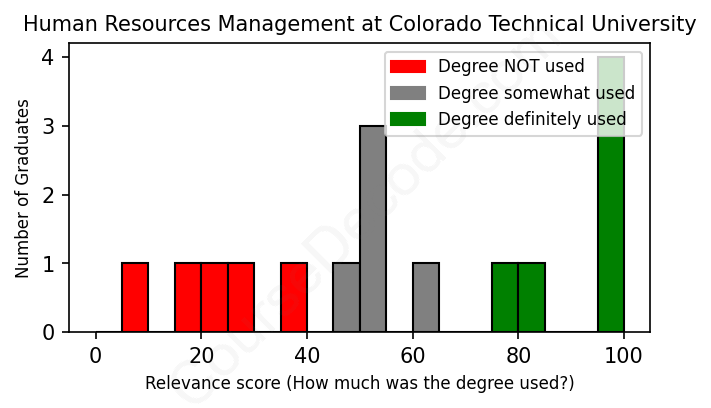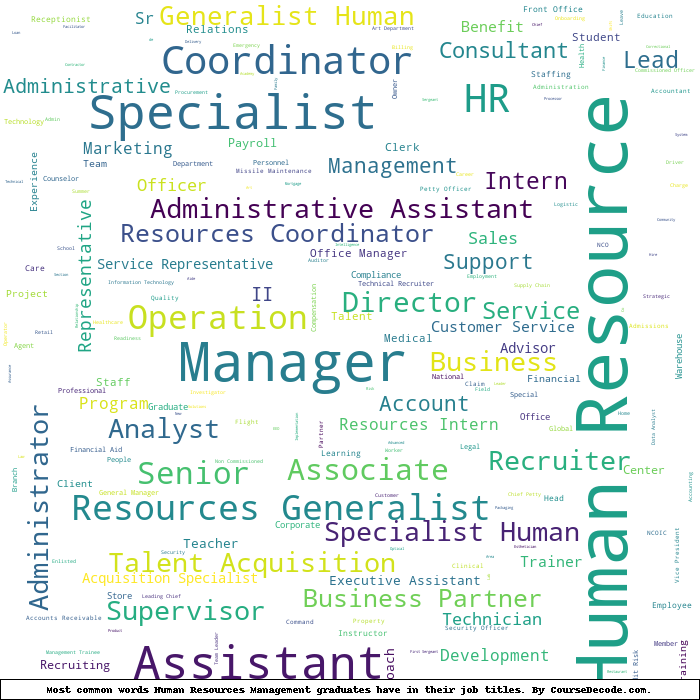
First, some facts. Of the Human Resources Management graduates from Colorado Technical University we've analyzed , here's how many have used (or NOT used) their degree in their career:

These are estimates based on AI analysis of 16 LinkedIn profiles (see below).
The verdict? Below average. Overall, with an average relevance score of 57%, Human Resources Management graduates from Colorado Technical University have a lower likelihood (-10%) of finding work in this field compared to the average graduate across all fields:
And for comparison, here's the chart for all profiles we've looked at across all degrees.
Also, after graduating, 43% of these graduates have pursued further education other than another Bachelor's degree (such as a Masters degree or other), compared to the average across all profiles of 35%. This suggests you may need more than just a Bachelors degree to be competitive as a Human Resources Management graduate.
See the details:
|
Relevance score: 50% We think this person has gone into a career only somewhat relevant to their degree. We think this person has gone into a career only somewhat relevant to their degree.
DEGREE INFOGraduated in 2013 from Colorado Technical University with a Bachelor of Business Administration (B.B.A.) in Human Resources Management. Also pursued further education since (see below). JOB HISTORY SINCE GRADUATIONSCM Strategic Services(buyer) Savannah River Nuclear Solutions Oct 2014 - Present FURTHER DEGREES DONE SINCE GRADUATINGMasters DegreeAmerican InterContinental University 2016 - 2017 ABOUTLiving life to the fullest and providing for my family |
The top 10 most common jobs done by the graduates we've analyzed (ranked most common to least) are:
The most common types of jobs that graduates with a degree in Human Resources Management from Colorado Technical University have taken include positions like Human Resources Manager, Equal Opportunity Advisor, and various Trainer roles. Many graduates have found themselves in roles directly related to HR, especially in training and development, where skills from their degree are put to good use in managing employee onboarding and continuous education. However, a significant number of graduates also ended up in jobs that aren’t strictly HR-focused, like administrative roles, operational management, or even positions in unrelated fields such as healthcare or customer service.
While some graduates have managed to secure relevant HR positions, many others seem to drift into roles that do not align closely with their HR training. For example, positions like Program Assistant or Security Analyst do not require HR competencies, highlighting a disparity between their education and actual job relevance. Overall, it's a mixed bag: while many graduates use their HR skills in their jobs, a notable portion has ventured into roles where HR knowledge isn't the main focus, indicating that the job market for HR-specific roles might not be as robust as one would hope.
Here is a visual representation of the most common words in job titles for Human Resources Management graduates (this is across all Human Resources Management graduates we've analyzed, not just those who went to Colorado Technical University):

Looking at the career paths of graduates from Colorado Technical University with degrees in Human Resources Management, it's pretty clear that many of them have pursued various relevant careers within the field over the years. Right after graduation, a lot of these graduates landed entry-level roles like HR assistants or training positions, which is pretty typical. For example, some took on roles in administrative capacities or as trainers, setting a solid foundation for their HR careers. Over time, as they gained experience, many moved up to HR manager or even director positions, which shows that they were able to grow within the field. It's great to see that several have transitioned into high-level roles like Human Resources Director, demonstrating that a solid start often leads to significant advancements.
However, it's also noticeable that not everyone stayed directly within the HR field long-term. Some graduates ended up taking on jobs that don’t seem closely related to HR, such as positions in operations, customer service, or even completely different industries. This variation suggests that while a degree in Human Resources can open doors, the career trajectories can differ widely based on personal choices and available opportunities. Overall, many have done well for themselves, especially those who remained focused on HR—it's a testament to the versatility of their education, even if it means some have branched out into other areas along the way.
Pursuing a Bachelor’s degree in Human Resources Management can be a pretty manageable challenge, especially at a school like Colorado Technical University, which is known for its supportive environment and flexible learning options. The coursework typically covers essential topics like employee relations, organizational behavior, and management principles, which can be interesting and relatable if you enjoy working with people and understanding how businesses operate. While it does require some dedication and time management—like any degree—you might find that it’s not as tough as more technical fields, like engineering or math. So, if you’re motivated and keep up with your studies, you’ll probably find it easier to handle than you might expect!
Most commonly, in the LinkedIn profiles we've looked at, it takes people 2 years to finish a Bachelor degree in Human Resources Management.
Looking at these Colorado Technical University grads, it seems like they’ve had some ups and downs with their paychecks. A few of them jumped right into decent roles; for example, the Director of Operations at The Hunter Foundation likely makes a pretty nice salary since that position usually comes with a good paycheck. However, others, particularly those who started off in entry-level jobs like customer service and assistant roles, might not be raking in the big bucks just yet. Overall, it seems some have managed to climb the ladder and probably earn respectable salaries now, while others are still moving through the ranks, which can make it a bit of a mixed bag. So, if you're hoping to hit it big right away, keep in mind that many start at the bottom and work their way up!
Here is a visual representation of the most common words seen in the "about" section of LinkedIn profiles who have a Bachelor degree in Human Resources Management (this is across all Human Resources Management graduates we've analyzed, not just those who went to Colorado Technical University). This may or may not be useful:

Here are all colleges offering a Bachelor degree in Human Resources Management (ordered by the average relevance score of their Human Resources Management graduates, best to worst) where we have analyzed at least 10 of their graduates:
| College | Score | Count |
|---|---|---|
 San Jose State University San Jose State University
|
83 | 14 |
 Western Governors University Western Governors University
|
71 | 50 |
 Saint Leo University Saint Leo University
|
71 | 12 |
 Davenport University Davenport University
|
71 | 11 |
 Capella University Capella University
|
70 | 15 |
 Rutgers University Rutgers University
|
67 | 14 |
 Southern New Hampshire University Southern New Hampshire University
|
66 | 30 |
 Lindenwood University Lindenwood University
|
64 | 11 |
 DeVry University DeVry University
|
63 | 31 |
 University of Maryland Global Campus University of Maryland Global Campus
|
61 | 22 |
 Upper Iowa University Upper Iowa University
|
61 | 12 |
 Columbia Southern University Columbia Southern University
|
59 | 28 |
 Central Michigan University Central Michigan University
|
57 | 15 |
 Colorado Technical University Colorado Technical University
|
57 | 16 |
 American InterContinental University American InterContinental University
|
56 | 24 |
 University of Phoenix University of Phoenix
|
55 | 90 |
 Ashford University Ashford University
|
52 | 36 |
 American Military University American Military University
|
52 | 13 |
 Park University Park University
|
52 | 21 |
 University of Maryland University College University of Maryland University College
|
51 | 15 |
 Strayer University Strayer University
|
47 | 31 |